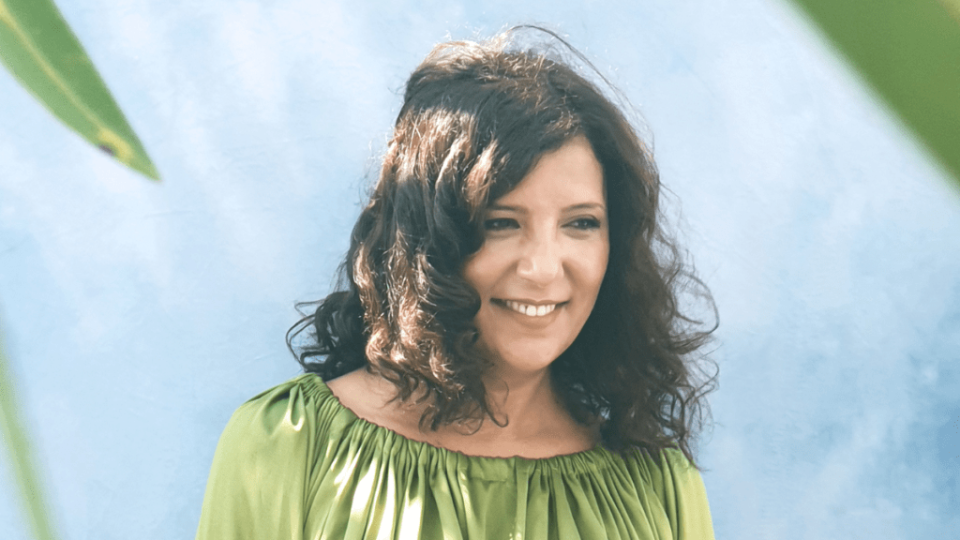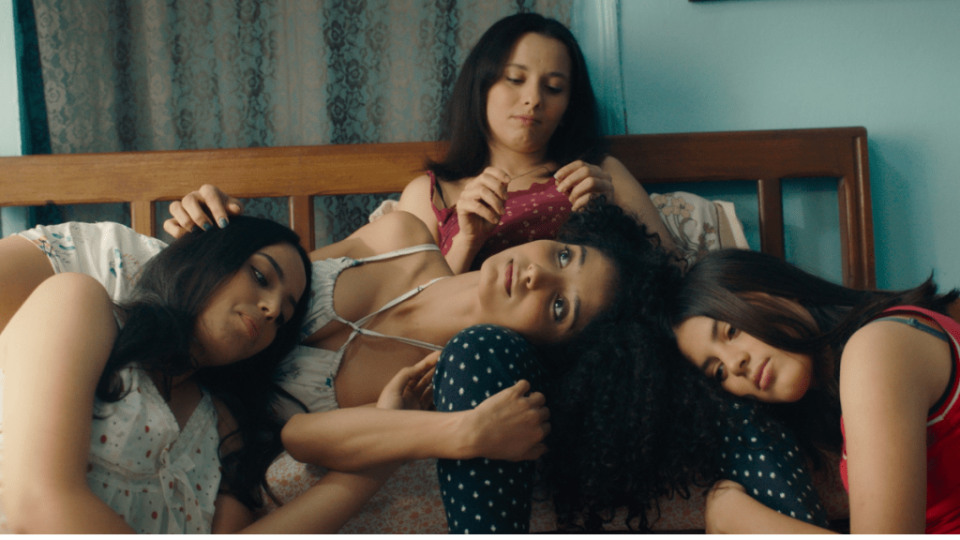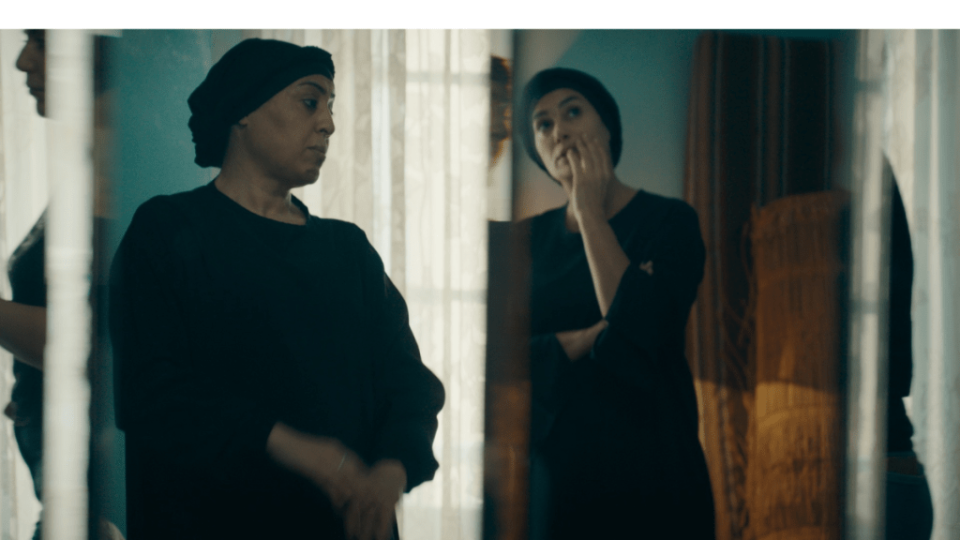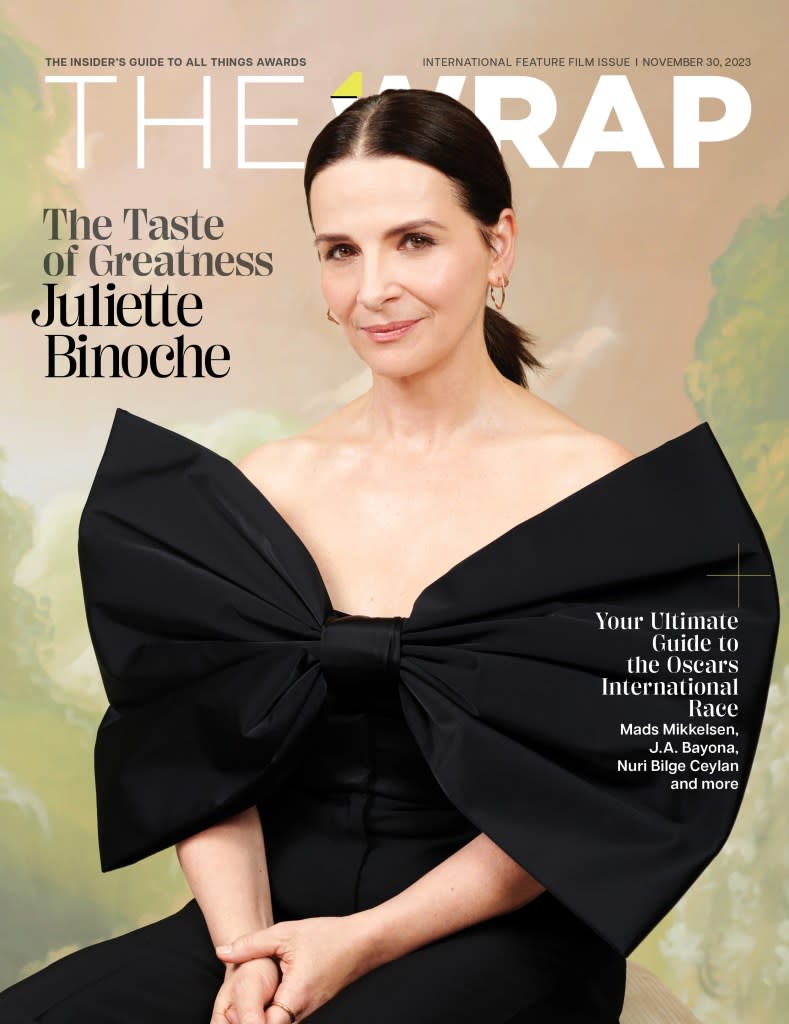How ‘Four Daughters’ Turned a Family’s Tragedy Into Therapy
In “Four Daughters,” Kaouther Ben Hania explores the story of Olfa Hamrouni, a Tunisian woman whose two eldest daughters, Ghofrane and Rahma, became radicalized and in 2015 joined the Islamic State in Libya, where they are now in prison. Ghofrane give birth to a baby girl, who lives with her in prison.
Ben Hania’s genre-blending film interweaves documentary-style interviews with Hamrouni and her two younger daughters, Eya and Tayssir, with dramatic reenactments by the Hamrouni women and three actresses, including the Egyptian-Tunisian star Hend Sabri. It is a powerful meditation on intergenerational trauma, memory and healing. “Four Daughters” played in the main competition at Cannes, where it won the Golden Eye (L’oeil d’or) prize for best documentary (shared with Asmae El Moudir’s “The Mother of All Lies”). The film is Tunisia’s entry for the 2024 Oscar for best international feature — a distinction Ben Hania was enjoyed twice before. And her previous movie, “The Man Who Sold His Skin,” was nominated for best international film at the 2021 Academy Awards.
Ben Hania spoke to us about her boundary-pushing new film.
How did you decide to work in this space between fiction and documentary, in which the real Olfa, Eya and Tayssir appear on screen alongside actresses stepping in for Olfa and her daughters lost to ISIS?
When I started this project in 2016, I was thinking I’d do a fly-on-the-wall documentary, but it didn’t work. It could not tell the multilayered [story] and it didn’t give me access to the past, which was very interesting to me — to dig into this past to understand the origin of their tragedy. At some point, I thought to myself, reenactment is such a cliché, so I’ll use [the cliché], I’ll hijack it as a way to summon the past and [let] the family think about this past, [let] the actor ask questions about motivation. I love the idea of using this cliché to be in the scene, out of the scene, like in Brechtian theater.

There are scenes where the women are just being themselves, like when Hend Sabri calls Olfa out for judging her daughters, or when Eya and Tayssir are lounging with the actresses who play their sisters, talking about puberty and their changing bodies — very universal themes.
Yes, absolutely. That’s the kind of conversation I had with my sister, my cousin — I mean, every girl all around the world has those moments. The movie was a work in progress all the time. For example, when we took breaks, I’d observe them, and they’d start talking, start singing. And I’d say, “Let’s shoot this.” That’s why it’s a documentary, despite the fact that I have actors, because the actors are reacting as [themselves]. Hend Sabri is like the mirror for Olfa, and it was interesting to divide Olfa’s character in two. The actors were amazing, [even if] they were lost. Hend Sabri was asking me every day, “What is this movie?” Because actors are used to having a screenplay to work on their character. They’re not used to meeting the real [person] that they are playing — and also criticizing them. It’s not comfortable, but it was really fascinating and exciting.

Those scenes also show how deeply they trusted you.
Yeah. When I met Olfa and her daughters in 2016, she had done some radio and TV interviews, and she was attacked on social media in Tunisia. They were persona non grata in their neighborhood; there was the shame of what her [eldest] daughters did. I was the only person that wasn’t judging them and was willing to hear them. So we developed a very strong relationship. I knew that it was sensitive — it’s their life, their trauma. So I wanted the set to be a safe place for them. I had a majority female crew, and we tried to make this atmosphere very caring and not judgmental.
There is a moment when Majd Mastoura, who plays a few different men in the reenactments, stops the scene because he is so troubled by what Eya was saying. [She suggests that one of her mother’s ex-boyfriends abused her and her sisters: “When he got bored with the mother, he moved on to her girls.”] I assume you just had to improvise on the spot to figure out how to move forward from there?
All of the movie is a bit like this: I had to improvise. There was nothing scripted. It was like, ‘On this day, we will shoot this memory.’ And they start talking, reenacting, asking questions. [Eya and Tayssir] went through psychotherapy [to deal with the trauma] and [they want] to tell those stories. When he was asked to play this character, and he started hearing those harsh confessions, he was like, ‘What am I doing here? I’m just an actor.’ So that’s why he stopped the scene. But Eya was reassuring all of us; she was more mature than all of us, telling us, ‘It’s nothing. I’ve told this story many times. Don’t be scared.’ She said to me, ‘He’s an actor. Tell him that it’s dialogue, so he can’t be scared.’ It was her courage that motivated me to put this scene in the film.
They are so open to sharing their emotions. It seems the experience of making the film was therapeutic for them. Was that something you thought about from the beginning, that the film would serve as therapy for this family that’s been through so much trauma?
Yes, I knew that the movie would introspective, but I underestimated how therapeutic [it would be]. What happened on the set was like magic. When we started, for example, Eya and Olfa didn’t talk to each other. They were fighting — you know, “You’re my mother. I hate you.” And since the movie gave Eya the opportunity to tell her mother some stuff, they became closer. You see them kissing each other and [saying], “You look like me.” It was at the end of the shoot. Sometimes when I’m depressed, I think about how cinema can change things. And it can. Also, the sisterhood that was created between the two young actresses and the two younger daughters — I didn’t expect it, but they became very close.

You mentioned shame earlier. Olfa carries around a lot of shame and has this deep internalized misogyny that she expresses via violence against her daughters. Several times, the women talk about her beatings. But she’s also trying to protect them from the type of abuse she went through as a young woman and wife. And there is the scene where she says she hates how she looks in hijab, but tells her daughters how wonderful they look in it. She’s full of contradictions.
Yeah. I love contradictory characters, I love people who have conflict within themselves, and I wanted to explore this. Olfa is the guardian of old patriarchy. She’s a very strong woman, she’s not submissive. But she had this idea — and I think it’s linked to her upbringing in a very difficult neighborhood — that in [acting like] a man, she can save her daughters in a way. But it’s completely the wrong way to treat those young girls. She talks about malediction. She can’t understand why there is a malediction. And for me, it’s patriarchy. That is the real malediction — the way things happened to her, how she’s reproducing the same mistakes. That’s a common theme all over the world. We [try] not to reproduce [mistakes] with our children, but it’s not easy. Motherhood is not easy. Womanhood is not easy. And the movie tackles all those things.
This movie has been so well received, including at Cannes in May, and it is Tunisia’s Oscar submission for Best International Feature Film. How have Olfa, Eya and Tayssir adjusted to all the public attention?
For them, the main idea is to be heard. When I met Olfa, she was talking on TV and her main obsession was to be heard. Cinema is a place where you can have depth and explain things. So the main thing for them is: “Now we are heard. Thank you, Kaouther. Now our voice can can be heard.” They are doing many festivals, traveling a lot with the movie. So this is wonderful. And Olfa wants to get her granddaughter back from jail. So that’s also another level of pleading their cause.
Read more from the International issue here.

The post How ‘Four Daughters’ Turned a Family’s Tragedy Into Therapy appeared first on TheWrap.


